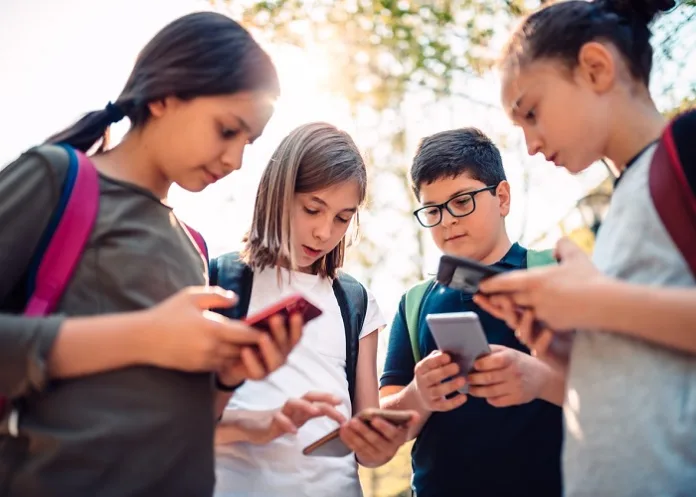The United States has issued a public advisory to American parents about the risks of social media to young people, urging them to fully understand “the possible harm to the mental health and well-being of children and adolescents”.
In an unprecedented 19-page advisory, US Surgeon-General Dr Vivek Murthy noted that the effects of social media on adolescent mental health were not fully understood, and while social media could be beneficial to some users, “there are ample indicators that it can also have a profound risk of harm to the mental health and well-being” of youngsters.
The report included practical recommendations to help families guide children’s social media use, including creating a “family media plan” and boundaries around content and keeping personal information private.
Additionally, reports The New York Times, Murthy also called on tech companies to enforce minimum age limits and to create default settings for children with high safety and privacy standards. And he urged the government to create age-appropriate health and safety standards for technology platforms.
Adolescents “are not just smaller adults,” he said. “They’re in a different phase of development, and they’re in a critical phase of brain development.”
The report, highlighting long-simmering concerns around social media in the national conversation, came as state and federal lawmakers, many of them raised in an era when social media barely existed or didn’t exist at all, have been struggling with how to set limits on its use.
Montana’s governor recently signed a Bill banning TikTok from operating in the state, prompting the Chinese-owned app to file a lawsuit and young TikTok users to lament what one called a “kick in the face”, and in March, Utah became the first state to prohibit social media services from allowing under-18s to have accounts without the explicit consent of a parent or guardian. That law could dramatically curtail young people’s access to apps like Instagram and Facebook.
Survey results from Pew Research have found that up to 95% of teens reported using at least one social media platform, while more than one-third said they used social media “almost constantly”. But as social media use has risen, so have self-reports and clinical diagnoses among adolescents of anxiety and depression, along with emergency room visits for self-harm and suicidal ideation.
The report could help encourage further research to understand whether these two trends are related. It joins a growing number of calls for action around adolescents and social media.
Earlier this month, the American Psychological Association issued its first-ever social media guidance, recommending parents closely monitor teens’ usage and that tech companies reconsider features like endless scrolling and the “like” button.
A large body of research has emerged in recent years on the potential connection between social media use and soaring rates of distress among adolescents. But the results have been consistent only in their nuance and complexity.
An analysis published last year, examining research from 2019 to 2021 on social media use and mental health, found that “most reviews interpreted the associations between social media use and mental health as ‘weak’ or ‘inconsistent,’ whereas a few qualified the same associations as ‘substantial’ and ‘deleterious’”.
At their clearest, the data indicate that social media can have both a positive and negative impact on the well-being of young people, and that heavy use of social media – and screen time generally – appears to displace activities like sleep and exercise that are considered vital to developing brains.
On the positive side, social media can help many young people by giving them a forum to connect with others, find community and express themselves.
At the same time, the Surgeon-General’s advisory noted, social media platforms brim with “extreme, inappropriate and harmful content”, including content that “can normalise” self-harm, eating disorders and other self-destructive behaviour. Cyberbullying is rampant.
Moreover, social media spaces can be fraught for young people especially, the advisory added: “In early adolescence, when identities and sense of self-worth are forming, brain development is especially susceptible to social pressures, peer opinions and peer comparison.”
The advisory noted that technology companies have a vested interest in keeping users online, and that they use tactics that entice people to engage in addictive-like behaviours. “Our children have become unknowing participants in a decades-long experiment,” the advisory states.
A spokesperson for Meta, the owner of Instagram and Facebook, said that the advisory included recommendations that “are reasonable and, in large part, Meta has already implemented”. Those measures include automatically making the accounts of under-16s private when they join Instagram and limiting the types of content teens can see on the app.
TikTok did not immediately respond to requests for comment.
The advisory did not provide guidance on what a healthy use of social media might look like, nor did it condemn social-media use for all young people. Rather, it concluded: “We do not yet have enough evidence to determine if social media is sufficiently safe for children and adolescents.”
The Surgeon-General’s position was intended, the report said, to call Americans’ attention to “an urgent public health issue” and to make recommendations for how it should be addressed.
Similar reports from past Surgeons-General helped to shift the national conversation around smoking in the 1960s, drew attention to HIV and Aids in the 1980s, and declared in the early 2000s that obesity had become a nationwide epidemic.
SG advisory
See more from MedicalBrief archives:
Concern as social media fuels global weight loss drug fad
Social media stress can lead to social media addiction
Excessive social media use is comparable to drug addiction
First causal linking of social media use and decreased well-being
Social media’s impact on mental health: An 8-year longitudinal study

